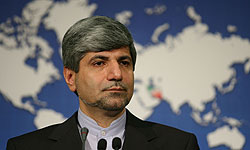The Iranian foreign ministry called for the rapid expulsion of the terrorist Mojahedin-e Khalq Organization (MKO) from neighboring Iraq, and called on the European countries which support the terrorist group to shelter its members. 
"The grouplet’s (MKO’s) fate should be determined as soon as possible," Foreign Ministry Spokesman Ramin Mehman-Parast said on Tuesday, asking those European states which provide support for the terrorist group to transfer them from Iraq and shelter them in their countries.
The reason why Europeans support the MKO, but refrain from sheltering its members lies in the fact that "they like insecurity to remain in the regional countries but they themselves continue to live in security and support such groups", he reiterated.
Mehman-Parast described the European states’ behavior as unacceptable, and said those countries which claim to be advocates of human rights should confront the terrorist groups like the MKO.
The Iraqi government in late 2011 forced members of the MKO out of their main training camp in the Northern Diyala province.
According to reports, one of the ringleaders of the MKO announced that the MKO was about to start relocating its members from their headquarters to a new place in Iraq.
He added that the first group of MKO members were about to be transferred to a new place specified by the Iraqi government.
Iraqi Government Spokesman Ali Al-Dabbaq stressed on Wednesday that Baghdad had not extended the presence of the MKO in Iraq, dismissing western media reports that had alleged to the opposite.
"The deadline for MKO’s presence on Iraq’s soil has not been extended but the way they will leave Iraq has changed and will take place in two phases," Dabbaq stated.
"Based on the agreements made with the UN, the MKO members will leave Iraq’s soil in two phases, they will be relocated to Camp Liberty and then leave the Iraqi soil from the camp," Dabbaq said.
"As we have earlier announced, the MKO members will leave Camp Ashraf (now the Camp of New Iraq) by the end of 2011," Dabbaq underscored.
Based on the UN proposal, the MKO members will be moved to Camp Liberty base, the US former base near Baghdad’s airport.
Since the beginning of 2011, the Baghdad government has repeatedly assured Iranian officials and people that it is determined to expel the MKO from Iraq by the end of 2011.
Meantime, a report in December disclosed that the main leader of the MKO, Massoud Rajavi, in remarks interpreted as informally declaring war on Iraq cautioned that he would not allow Baghdad to expel the group from Iraq, and stressed that he will keep the MKO in the country even if it costs the lives of all the group members.
According to a report published by the Habilian website, Rajavi has ordered the commanders of Camp Ashraf (the MKO’s main training center located in Iraq’s Northern Diyala province) to be ready to resist against the Iraqi forces, saying that it would not matter if all Camp residents are killed for obtaining his desired goals.
He also ordered his commanders to strengthen the military positions at the camp and in the surrounding areas by erecting numerous bulwarks and hurdles around the Camp and be ready for a war with the Iraqi government.
The MKO has been in Iraq’s Diyala province since the 1980s.
The MKO, whose main stronghold is in Iraq, is blacklisted by much of the international community, including the United States.
The MKO is behind a slew of assassinations and bombings inside Iran, a number of EU parliamentarians said in a recent letter in which they slammed a British court decision to remove the MKO from the British terror list. The EU officials also added that the group has no public support within Iran because of their role in helping Saddam Hussein in the Iraqi imposed war on Iran (1980-1988).
The group started assassination of the citizens and officials after the revolution in a bid to take control of the newly established Islamic Republic. It killed several of Iran’s new leaders in the early years after the revolution, including the then President, Mohammad Ali Rajayee, Prime Minister, Mohammad Javad Bahonar and the Judiciary Chief, Mohammad Hossein Beheshti who were killed in bomb attacks by MKO members in 1981.
The group fled to Iraq in 1986, where it was protected by Saddam Hussein and where it helped the Iraqi dictator suppress Shiite and Kurd uprisings in the country.
The terrorist group joined Saddam’s army during the Iraqi imposed war on Iran (1980-1988) and helped Saddam and killed thousands of Iranian civilians and soldiers during the US-backed Iraqi imposed war on Iran.
Since the 2003 US invasion of Iraq, the group, which now adheres to a pro-free-market philosophy, has been strongly backed by neo-conservatives in the United States, who also argue for the MKO to be taken off the US terror list.
